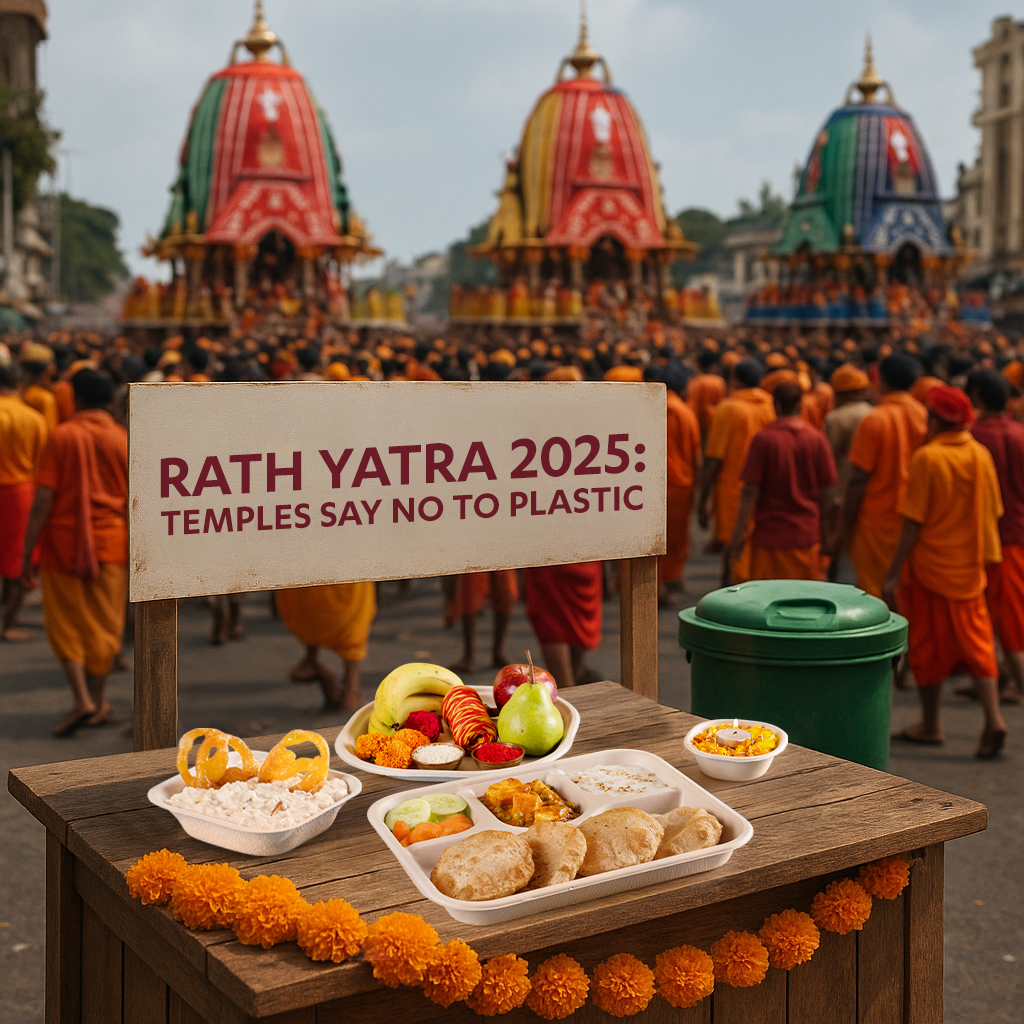India is deeply rooted in tradition, but it is also undergoing change. A subtle yet much-needed transformation is taking place as the nation gets ready for the Rath Yatra 2025, one of its most cherished religious yatras. It’s 2025, and faith is now traveling a different path, from the historic streets of Jagannath Puri to temple communities all over the country. More Indian temples are opting to eschew single-use plastics in favour of eco-friendly practices based on accountability and respect because of increased awareness of pollution and waste. The call this year is to continue a cleaner heritage rather than merely pull the chariot.
What Is Rath Yatra and Why It Matters in 2025
One of India’s most important religious celebrations, the Rath Yatra is devoted to Lord Jagannath and his siblings. It will take place on June 27, 2025, at Jagannath Puri, Odisha. This year’s organizers along with government officials are emphasizing a plastic-free celebration by substituting eco-friendly disposable plates, bowls, and utensils for single-use plastic, illustrating how devotion and sustainability can coexist.
During the forthcoming Rath Yatra, Sambalpur MP and Union Education Minister Dharmendra Pradhan has also urged followers to refrain from using single-use plastics. He highlighted the festival’s spiritual significance in a video message, saying:
“The Rath Yatra symbolizes Lord Jagannath’s benevolence and accessibility to devotees worldwide.”
He voiced concern about the negative effects of plastic garbage on the environment, pointing out that it contaminates the sea and neighbouring canals, damages wildlife, and pollutes the “Bada Danda.”
He reaffirmed Odisha’s dedication to the “Swachh Odisha, Khushi Odisha” initiative and urged people to abstain from single-use plastics like plastic disposables, polyethene and more in Puri from Rath Yatra to July 5 Bahuda Yatra.
Jagannath Puri Leads the Plastic-Free Movement
During Rath Yatra, the Shree Jagannath Temple Administration (SJTA) has strictly prohibited the use of plastic on the temple grounds and in the adjacent walkways. It is forbidden for vendors to use plastic containers, plates, bottles, or bags for pilgrim offerings or prasadam/ prasad.
Instead, they are asked to use biodegradable or compostable plates, made of earthenware, sugarcane bagasse, or leaves – continuing the environmental impact reduction efforts that began in 2024.
Chuk Joins Hands with Sukh Sagar Hospitality Services For Plastic-free Rath Yatra 2025
Chuk, India’s trusted compostable disposable brand made from sugarcane bagasse, has partnered with Sukh Sagar Hospitality to support the Plastic-Free Rath Yatra 2025.
Pilgrims dining at Sukh Sagar, Udipi, and other key food spots will now be served on 100% compostable and toxin-free Chuk plates, bowls and more ensuring a cleaner celebration, supporting government initiatives.
Why Compostable disposable Plates Replace Plastic
Plastic plates and bowls used during mass gatherings often end up as litter, clogging drains and harming wildlife. Reports show:
- 9.2 billion tonnes of plastic produced since 1950: less than 10% recycled.
- In Puri, tonnes of waste are generated per day during Rath Yatra – with a major portion being plastic.
So many temples are moving to:
- Compostable disposables such as plates/bowls made from sugarcane bagasse, earthenware, or leaf plates
- Certified, food grade and toxin-free Chuk compostable disposable plates – plastic-free, no lining, just pure fibre and fully degradable in under 180 days.
Real-Time Waste Management During Rath Yatra 2025
Puri municipality, NGOs, and partners such as CocaCola (HCCB) are implementing robust waste management:
- Segregated bins every 50m along routes
- Recycling 30 lakh PET bottles during the 2024 festival
- Using Reverse Vending Machines and incentivizing pilgrims for recyclable waste
- Union Minister Dharmendra Pradhan urged a total ban on single-use plastic from June 27 to July 5, 2025
Other Indian Temples Joining the Movement
Beyond Puri, other temple towns are participating:
- In Prayagraj, Rath Yatra idols are crafted from soil and recycled paper – no plastic components. The local artisans were asked to curate idols in an eco-friendly manner.
- In Ranchi, food vendors at Rath Mela are barred from all plastic plates or disposables, with only leaf, bamboo, eco-friendly disposables and earthen utensils allowed.
This movement towards plastic-free temple events is gaining nationwide momentum.
Impact & Pilgrim Feedback
- Puri sees tonnes of waste per day, previously much of which was plastic
- 30+ lakh PET bottles collected during the 2024 festival and recycled
- Union Minister highlighted plastic’s threat to wildlife and marine life- campaigning publicly during Rath Yatra
The environment is cleaner and there is less plastic garbage, according to pilgrims. Praise for “no plastic zones” has resulted from early cleanups, particularly in the area around temples.
Chuk’s Role in Indian Temple Feasts and Prasad
In keeping with temple eco-initiatives, Chuk provides compostable disposable plates and bowls made of sugarcane bagasse:
- Free of plastic, tree-free, and of guaranteed food safe.
- Leak-proof, heat-resistant, and compostable in 180 days.
- Particularly beneficial in areas with large Prasad distribution volumes
Sustainability and spiritual principles mesh well when vendors transition to Chuk’s products, bringing faith-driven environmental transformation to fruition.
Why Plastic-Free Festivals Are the Future
A broader reality is brought to light by this push: environment and commitment are intertwined. The best places for promoting environmental consciousness are religious gatherings for obvious reasons.
- Government and temple bodies collaborate on cheery, waste-free zones
- Volunteers – “Safai Sathis” guide pilgrims on compostable use & disposal
- UN data shows <10% plastic recycling – temples can shift these norms every year with high usage of eco-friendly disposables, jute bags and other eco-friendly products.
Summary: The New Sacred Standard in Indian Temples
The 2025 Plastic-Free Rath Yatra is a watershed event. Temples such as Jagannath Puri are rethinking holy responsibility by loving the planet as an element of devotion, going beyond rituals.
What can you do?
- Offer compostable bowls and plates as assistance. Ask about the use of eco-friendly disposables when eating out.
- Don’t use single-use plastic.
- Participate as a volunteer or promote eco-waste management led by temples.
Quick Takeaways
| Initiative | Impact |
| Plastic bans in temple grounds
| Reduces plastic waste and keeps temple areas cleaner
|
| Use of compostable disposables
| Ensures prasad is served in eco-friendly disposables
|
| PET bottle collection & recycling
| Diverts millions of plastic bottles from landfills
|
| Adoption of sugarcane-based plates
| Promotes safe, scalable, and compostable alternatives
|
Written by: Akansha Pal, Pakka Ltd.


